
JOURNAL OF GENERAL INTERNAL MEDICINE
Scope & Guideline
Delivering Excellence in Patient Care and Research
Introduction
Aims and Scopes
- Primary Care and Patient-Centered Care:
The journal emphasizes research and practices that enhance primary care delivery and patient-centered approaches, including innovative care models, shared decision-making, and social determinants of health. - Health Disparities and Equity:
A significant focus on understanding and addressing health disparities across various populations, particularly among underrepresented and marginalized groups, is evident in the journal's recent publications. - Behavioral Health Integration:
The integration of behavioral health into primary care is a recurring theme, highlighting the importance of addressing mental health alongside physical health in patient care. - Quality Improvement and Patient Safety:
The journal publishes numerous studies on quality improvement initiatives and patient safety measures aimed at enhancing healthcare delivery in various settings. - Telehealth and Digital Health Innovations:
Research on the utilization and effectiveness of telehealth and digital health tools has gained prominence, particularly in response to the COVID-19 pandemic, showcasing the journal's commitment to evolving healthcare practices. - Medical Education and Training:
There is a consistent emphasis on improving medical education, including curricula focused on social determinants of health, health equity, and the integration of new technologies in training programs.
Trending and Emerging
- Social Determinants of Health:
There is an increasing emphasis on understanding how social determinants impact health outcomes, particularly in vulnerable populations, indicating a shift towards more holistic healthcare research. - Telemedicine and Remote Care Innovations:
The impact of telemedicine and remote care has surged, particularly in light of the COVID-19 pandemic, with a growing body of literature addressing its effectiveness and integration into routine practice. - Health Equity Initiatives:
A strong trend towards addressing health equity is evident, with numerous studies focusing on interventions aimed at reducing disparities in healthcare access and outcomes. - Interprofessional Collaborative Care Models:
Research highlighting collaborative care models involving various healthcare professionals is gaining traction, reflecting a movement towards team-based approaches in patient care. - Mental Health Integration:
The integration of mental health services into primary care settings is increasingly emphasized, reflecting a growing recognition of the importance of addressing mental health alongside physical health. - Patient Engagement and Empowerment:
Emerging studies focus on strategies to enhance patient engagement in their own care, including shared decision-making and the use of digital tools for patient empowerment.
Declining or Waning
- Traditional Hospital-Based Care:
With the growing emphasis on outpatient care, telehealth, and community-based interventions, traditional hospital-based care topics are appearing less frequently. - Pharmaceutical Interventions:
There is a noticeable reduction in articles focusing solely on pharmaceutical treatments without considering comprehensive care models or integrated approaches, possibly due to a shift towards holistic care. - General Research on Chronic Diseases:
While chronic diseases remain a critical area of focus, research that does not intersect with social determinants of health or patient-centered approaches appears to be waning. - Single-Disease Focus Studies:
The journal is moving away from studies that solely focus on single diseases without contextualizing them within broader health systems or social factors.
Similar Journals
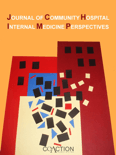
Journal of Community Hospital Internal Medicine Perspectives
Unlocking Knowledge for Healthcare ExcellenceJournal of Community Hospital Internal Medicine Perspectives is a peer-reviewed, open-access journal dedicated to the field of internal medicine, published by DIGITAL COMMONS BEPRESS. Since its inception in 2011, this journal has served as a vital platform for practitioners and researchers to disseminate high-quality research and insights pertaining to community hospital settings. With an ISSN of 2000-9666, it provides unrestricted access to articles that focus on clinical practices, innovative treatments, and medical education, ensuring that critical knowledge is available to healthcare professionals and scholars alike. Although its coverage in Scopus was discontinued in 2016, the journal maintains a notable presence in the medicine field, ranked in the 33rd percentile among its peers. This positioning highlights the journal's commitment to fostering advancements in community healthcare and addressing the unique challenges faced by practitioners in this vital area of medicine. By contributing to the ongoing dialogue in internal medicine, the Journal of Community Hospital Internal Medicine Perspectives continues to be a valuable resource for those aiming to enhance patient care and improve clinical practices within community hospitals.
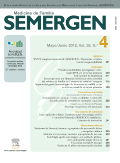
Medicina de Familia-SEMERGEN
Advancing family healthcare through innovative research.Medicina de Familia-SEMERGEN is a pivotal Spanish journal focused on the field of family medicine and public health, published by the esteemed Elsevier. With an ISSN of 1138-3593 and an E-ISSN of 1578-8865, this journal provides a platform for researchers and practitioners to disseminate innovative studies, clinical practices, and case reports that advance the understanding of family healthcare dynamics. As of 2023, it is categorized in Q3 in Family Practice and Q4 in Public Health, reflecting its significant contributions to the respective fields. The journal is indexed in Scopus, holding ranks of 31/56 and 473/665 for family practice and public health respectively, showcasing its relevance in academic discourse. While maintaining a commitment to quality research, Medicina de Familia-SEMERGEN remains accessible for professionals seeking to improve patient outcomes in family medicine, making it an essential resource for anyone in the health domain.
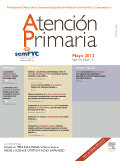
Atencion Primaria
Fostering Global Collaboration in Primary HealthcareAtencion Primaria is a premier open-access journal dedicated to the field of Family Practice and general medical sciences, published by EDICIONES DOYMA S A. Established in 1989, the journal has consistently provided a platform for groundbreaking research aimed at enhancing primary healthcare practices. With a current impact factor reflected in its Q2 placement in the Family Practice category and a commendable Q3 in the broader field of Medicine according to Scopus rankings, Atencion Primaria stands out as an influential resource for healthcare professionals, researchers, and students alike. The journal fully transitioned to open access in 2013, ensuring that its valuable content is accessible to a global audience, fostering the dissemination of knowledge in primary care strategies. With its home base in Barcelona, Spain, it serves as a vital conduit for research collaboration and knowledge exchange within the international medical community.

FAMILY MEDICINE
Elevating Standards in Family Medicine ResearchFAMILY MEDICINE is a prestigious peer-reviewed journal published by the SOC TEACHERS FAMILY MEDICINE, dedicated to advancing the field of family practice. With an ISSN of 0742-3225 and an E-ISSN of 1938-3800, this journal serves as a vital resource for researchers, healthcare professionals, and students involved in family medicine. Founded in 1985, it has consistently contributed to the growth of knowledge in this critical area, showcasing a wide range of original research, reviews, and practical applications. Recognized for its impact, the journal holds a Q2 quartile ranking in Family Practice, placing it in the top tier within its category, and ranks 22nd out of 56 in the Scopus database, reflecting its influence and relevance. While the journal operates under a subscription model, it remains committed to providing high-quality discourse and insights that shape the practice of family medicine. With a focus on current issues and evidence-based practices, FAMILY MEDICINE continues to be an essential publication for those dedicated to improving patient outcomes and advancing the field.
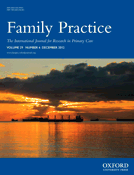
FAMILY PRACTICE
Innovating insights for the future of family practice.FAMILY PRACTICE is a premier peer-reviewed journal dedicated to advancing the field of family medicine, published by Oxford University Press. Established in 1984 and continuing its influential discourse into 2024, the journal holds an esteemed position in the academic community, as evidenced by its classification in the Q1 quartile for Family Practice, ranking 10th out of 56 in this category according to Scopus. With an impressive impact factor and a commitment to disseminating high-quality research, FAMILY PRACTICE serves as an essential resource for researchers, clinicians, and students alike, striving to enhance practice and education in family medicine through evidence-based insights and innovative practices. While the journal maintains a traditional subscription model, it supports broad dissemination of knowledge that contributes significantly to the evolving landscape of healthcare in the United Kingdom and beyond.
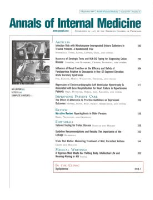
ANNALS OF INTERNAL MEDICINE
Shaping the Future of Medicine with Impactful ScholarshipANNALS OF INTERNAL MEDICINE, published by the American College of Physicians, stands as one of the leading journals in the field of internal medicine, with an impressive impact factor that underscores its significance in academic discourse. Since its inception in 1945, this esteemed journal has maintained a steadfast commitment to publishing high-quality research that spans a broad spectrum of internal medicine, making substantial contributions to clinical practice and health policy. With a current ranking of #5 out of 167 in the field of Internal Medicine and a remarkable 97th percentile ranking in literature, the ANNALS OF INTERNAL MEDICINE is recognized as a vital resource for researchers, healthcare professionals, and students alike. Although it operates under a traditional subscription model, the journal continually emphasizes the importance of disseminating robust clinical trials, systematic reviews, and expert commentaries that advance medical knowledge and practice. Its quartile rankings in Q1 for both Internal Medicine and Miscellaneous Medicine highlight its role in shaping the future of healthcare through rigorous and impactful scientific inquiry.

BJGP Open
Fostering collaboration in family medicine for better care.BJGP Open is a leading open-access journal published by the Royal College of General Practitioners, dedicated to advancing the field of family practice. Since its inception in 2017 and moving into its converged years until 2024, this journal has established itself as a pivotal resource for researchers, clinicians, and educators in the healthcare community. With an impressive Q1 ranking in Family Practice and a top 15% Scopus ranking, BJGP Open serves as a forum for high-quality, peer-reviewed research that directly impacts clinical practice in the United Kingdom and beyond. The journal underscores its commitment to accessible scholarly communication, having embraced open access since 2018, making its content freely available to all. This approach facilitates the dissemination of vital knowledge and practical insights, fostering improved patient care and professional development in the field of family medicine. Scholars and practitioners can benefit from BJGP Open's rigorous research, systematic reviews, and innovative approaches to health care. For more information, visit the journal's official site at 14 Princes Gate, Hyde Park, London SW7 1PU, England.
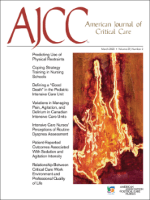
AMERICAN JOURNAL OF CRITICAL CARE
Empowering practitioners with cutting-edge knowledge.Welcome to the American Journal of Critical Care, a premier publication dedicated to advancing the field of critical care nursing and enriching the understanding of critical care practices. Established in 1992 and published by the American Association of Critical Care Nurses, this journal serves as a vital resource for researchers, practitioners, and students alike, providing cutting-edge research, insightful reviews, and evidence-based practices that shape modern critical care. With an impressive impact factor and distinguished rankings—ranking in Q1 for Critical Care Nursing and Q2 for miscellaneous Medicine in 2023—this journal underscores its significance in the healthcare landscape. Although it does not currently offer Open Access, the American Journal of Critical Care remains committed to disseminating high-quality knowledge that drives innovation and improves patient care in critical settings. Join us as we explore the latest advancements and pivotal studies that influence patient outcomes and shape the future of nursing practice.

CANADIAN FAMILY PHYSICIAN
Pioneering Insights in Canadian Family PracticeCanadian Family Physician, an esteemed journal published by College of Family Physicians Canada, is dedicated to advancing the field of family medicine. With a rich history spanning from 1977 to 2024, this journal provides a vital platform for scholars, practitioners, and students interested in family practice and its impact on general health. Though it does not currently offer open access, its rigorous peer-reviewed content contributes to its robust reputation, evidenced by its ranking in the top quartile (Q2) for Family Practice and its solid presence in the Q3 category for miscellaneous medicine as per the 2023 rankings. The journal plays a crucial role in disseminating valuable research findings, clinical insights, and innovative practices that enhance patient care in a Canadian context. By bridging the gap between research and practical application, Canadian Family Physician continues to be a significant resource for health professionals seeking to improve their knowledge and skills in family medicine, thereby fostering improved health outcomes across communities.
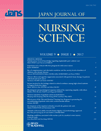
Japan Journal of Nursing Science
Exploring Evidence-Based Solutions for Modern HealthcareJapan Journal of Nursing Science, published by WILEY, serves as a pivotal resource in the field of nursing, focusing on innovative research and theoretical developments that enhance nursing science practices. With an ISSN of 1742-7932, this journal has established itself as a reputable platform, reflected in its 2023 rankings, which place it in the Q2 category for both Medicine (miscellaneous) and Research and Theory. Covering a broad range of topics crucial to the advancement of nursing, the journal provides researchers, professionals, and students access to high-quality studies, methodologies, and discussions that shape contemporary nursing practices and policies. Though not an Open Access journal, it contributes significantly to the academic discourse and research community, with emphasis on fostering evidence-based practices and promoting excellence in nursing education and healthcare delivery. With a cumulative publishing history from 2006 to the present, the Japan Journal of Nursing Science is committed to disseminating vital knowledge that enriches the nursing profession and improves patient care.